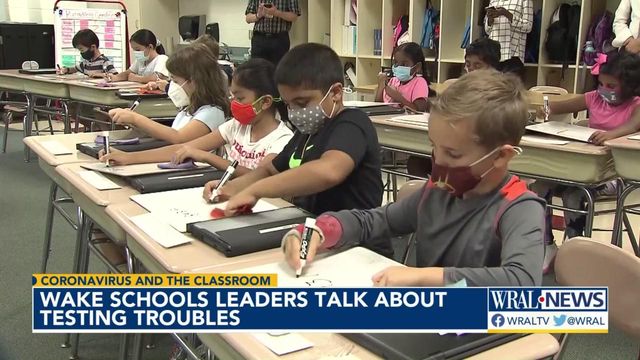Wake school board begins plans for coronavirus testing for students, staff
In a series of meetings Tuesday, the Wake County Board of Education will discuss staff vaccinations, coronavirus testing in schools and how to keep the virus out of classrooms.
Posted — UpdatedSome Wake County Board of Education members urged the district to create a testing program as soon as possible, calling such a move overdue to curb the spread of the novel coronavirus.
“I think we should be testing, yesterday,” Board Chairman Keith Sutton said.
Some board members expressed concern that the testing, however, could result in an initial spike of required quarantines as the district struggles to fully staff schools.
“We are going to see vaccinated people quarantined,” too, Board Member Roxie Cash said.
The school system's top two priorities are keeping schools open for daily, in-person instruction and keeping students healthy by minimizing quarantines and exposure.
Most North Carolina school districts are participating in the DHHS testing program, which is federally funded. But it’s not clear how many tests have been administered so far, with many districts opting in during an expansion of the program in August.
Wake County officials said Tuesday that getting the testing program up and running could take four to eight weeks.
COVID-19 cases remain far higher than just a couple of months ago in Wake County, as the more contagious so-called Delta variant of the virus continues to spread. The county has recorded thousands of new cases each week since late July, though the numbers have declined in the last couple of weeks.
The screening testing program is designed to catch cases of COVID-19 before people who are infected with the virus have a chance to spread it further within school.
The Wake County Board of Education did not take a vote during the meeting, which was a work session before the regular meeting Tuesday night.
Lead board attorney Jonathan Blumberg said he believed the board only needed to approve of a testing program if employees or students were required to participate in it.
After about an hour and a half of discussion, Superintendent Cathy Q. Moore said the district would pursue the voluntary program.
The district had planned to return with additional thoughts on a testing program for the board’s next work session, Oct. 5, but the board directed action sooner.
“I don’t think we can afford to waste or wait another day,” Sutton said.
Moore said the district would also plan for an expected federal mandate to require vaccines or regular testing for those who decline the vaccine.
Under President Biden's COVID-19 action plan, which includes schools, workplaces with more than 100 workers must test unvaccinated staff members weekly.
The testing would require consent from both employees and students’ parents.
Results would be available within 24 hours using the rapid antigen tests.
While officials outside of the board and district have recommended mandatory COVID-19 testing for unvaccinated employees and students, the board did not take issue with the voluntary nature of the state testing program.
Numerous people and parents, in written and spoken public comments, have urged the district to mandate vaccines for employees and screening testing.
At the same time, numerous others have continued to write and speak to the board against most COVID-19 protocols, particularly the requirement that students and employees wear masks to curb virus spread.
Sutton said the district would have to ask the community to help it out, framing it as a community issue, “If we’re going to get this under control, if we’re going to wrap our arms around this.”
The district’s reported employee vaccination rate exceeds the vaccination rate among adults in Wake County.
As of Friday, 85.9% of the district’s roughly 18,000 employees reported being fully vaccinated to the district. Another 1.5% reported being partially vaccinated.
But 1.4% said they had no plans to get vaccinated, and 6.7% have not responded to the district’s survey.
Of those 18 years and older in Wake County, 80% have received at least one dose and 77% are fully vaccinated.
Vaccines are currently only available for students 12 and up, and Wake leaders say 66% of the 12-17 age group has received at least one dose. As of Sept. 17, 61% of children 12-17 in Wake County are fully vaccinated.
The testing programs would be conducted by a contractor and it would include regular screening of certain groups the district has decided to zero in on — which could be student-athletes and others participating in higher-risk activities or unvaccinated teachers who have consented to being tested.
The district has submitted an opt-in form to use the North Carolina Department of Health and Human Services testing program and its eastern vendor, Mako Medical. It has not committed to using the program or vendor and has not signed a contract with anyone for COVID-19 testing on site.
The testing through Mako would be rapid antigen testing, which is less accurate that polymerase chain reaction (PCR) tests. But anyone who tests positive as a part of a screening pool would then take a PCR test to confirm that the antigen test was not a false positive.
Rapid antigen testing can also produce false negatives. District officials said that issue could be addressed with on-site diagnostic testing once someone shows symptoms.
Sutton recommended the district look into newer PCR tests that use saliva. Children, and their parents, would be more likely to consent to those PCR tests, versus less-pleasant nasal PCR tests. They’re also cheaper than PCR tests, Sutton said.
Hundreds of school districts are beginning to use them, according to a recent article in The 74 Million.
Those include nearly half of Illinois schools, Baltimore and Washington, D.C., schools, among others, the news outlet reported. The National Basketball Association also uses a saliva PCR test.
But some board members worried about unintended consequences of screening testing, such as an increase in employee quarantines while the district struggles with vacant positions and a shortage substitute teachers accepting assignments.
This week, the district told schools they would send Central Office staff to schools that need extra help, beginning Oct. 11, taking them off of their normal job duties.
The testing program would also include the ability for schools to test for COVID-19 on site for people exhibiting symptoms, without the help of the contractor, should they have the staff to administer those tests.
The district has already said they could not conduct a screening testing program without hiring a contractor, because of increased staff workload, and board members expressed concern Tuesday that schools would struggle to find people to administer those tests.
Mako would have to train school employees to conduct diagnostic testing that could occur any time of the day, Assistant Superintendent for Student Support Services Paul Koh told the board. Mako would be responsible only for the regularly scheduled screening testing.
The district is already short of school nurses, Moore said.
The district is funded for only one nurse for every two schools, but its struggle to hire for those positions means the district has only one nurse for every three schools, Moore said.
National recommendations call for a nurse at every school.
Nearly all of the district’s nurses are funded through a collaboratively funded partnership with the county, meaning those nurses also have county-related responsibilities and aren’t only working in schools.
“Currently our school nurses are not able to implement any support in terms of contact tracing or testing” for the district, Moore said.
• Credits
Copyright 2024 by Capitol Broadcasting Company. All rights reserved. This material may not be published, broadcast, rewritten or redistributed.






